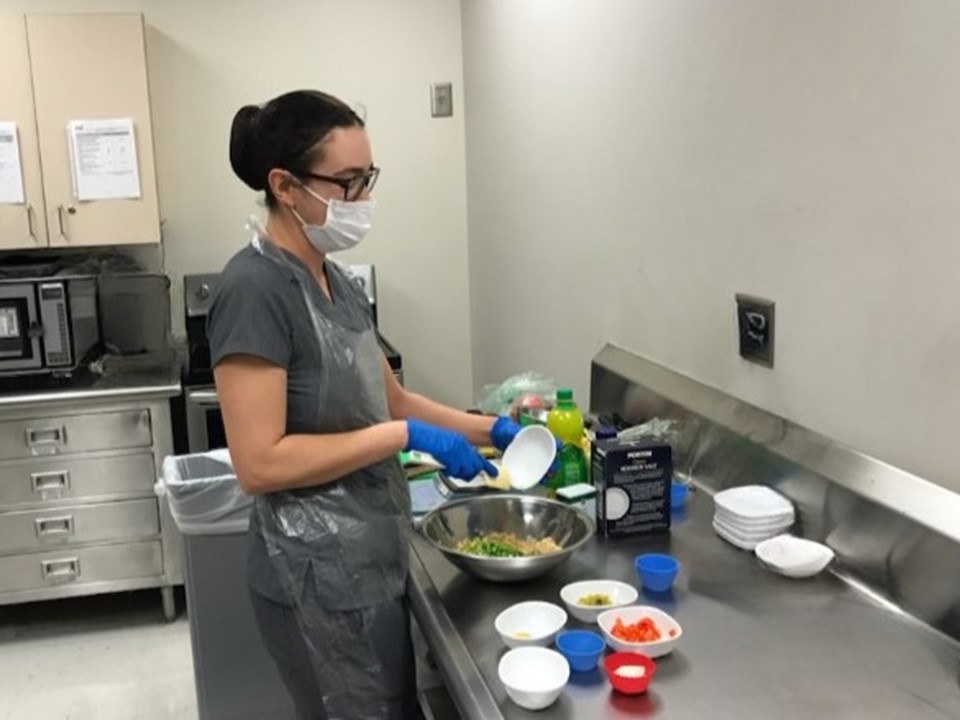Georgia CTSA Clinical Research Center Provides Valuable Bionutrition Services for Colon Cancer Prevention Study

“The overall goal of this current study is to test whether a high-fiber diet featuring legumes is beneficial for both weight loss and colon cancer prevention in a high-risk population,” says Terry Hartman, PhD, MPH, RD, Emory. “The study is being run through the Georgia CTSA Clinical Research Center (GCRC); they have been involved from the onset. We see all participants at the GCRC, from their screening to all their appointments where they meet with the nursing staff, Dr. Ziegler, and the dieticians affiliated with the CTSA. The GCRC also provides all the study entrées, and their dietitians provide counseling to help people achieve weight loss at a healthy rate.”
Terry Hartman, PhD, MPH, RD, Professor of Epidemiology and Nutrition and Health Sciences, Rollins School of Public Health, Emory University, and research colleagues, including Georgia CTSA Clinical Research Center (GCRC) co-director Tom Ziegler, MD, build upon previous research demonstrating that short-term strictly monitored increases in fiber-rich food consumption facilitates weight loss and suppresses biomarkers of cancer risk. Their current proposed study involves a 12-month parallel arm randomized clinical trial featuring pre-portioned entrées and strategic nutritional instruction to integrate legumes into a healthy high-fiber diet pattern.
Obesity is a significant public health concern and a well-known risk factor for colorectal cancer (CRC). Consuming a high-calorie and high-fat Western diet deficient in fiber-rich foods is a key driver of metabolic diseases like obesity and CRC and a growing concern for many people. Diets high in fiber that include foods like legumes (i.e., dry beans and lentils) may have a positive impact on the underlying biological processes that mediate the relationship between obesity and cancer. The research targets a diverse population at the highest risk for CRC to test whether a high-legume, high-fiber diet will increase weight loss and suppress biomarkers of cancer risk compared to a control diet. The results of this study may demonstrate substantial potential for dietary change to reduce mortality from CRC and other Westernized diseases.
Since its beginning, the trial has been successful in recruiting a diverse population of participants at the highest risk for colorectal cancer. Among those participants, several have expressed their gratitude toward their involvement in the study, the support and accommodations provided by the research study staff, as well as the positive impact it has had on their lives. Dr. Hartman adds, “The participants in the study love the staff. They love Dr. Ziegler, the dietitians, Heather and Kristen, and the nurses, really everybody that is the face of the study. We receive many compliments about the study staff and all the people involved.”
Dr. Hartman comments, “Something we’ve found most valuable is the flexibility of the staff at the GCRC. This study started during COVID, so we had to determine a way to provide entrées to people without requiring them to come inside, put on a mask, etc. The nutrition group figured out a way to provide a combination of fresh and frozen entrees to people able to drive and pick it up, like takeout, so they wouldn't have to get out of their car. That worked well, and we're still doing it today because it works so well. It's convenient, too, and that flexibility made a big difference.”
“It's been convenient for the study because we don't have to find somebody to draw blood, the nurses do that. We don't have to process the samples, and when we want to send samples off to our colleagues in Pittsburgh, the GCRC laboratory staff will do that. They're all very conscientious, helpful, and nice.”
Learn More